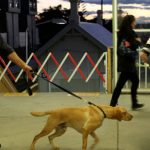Your Rights When Approached by Police at Music Festivals

The hot weather is starting to kick in and with it, the festival season is upon us. Thousands of revellers are gearing up to take in their favourite live music acts, get down to some old skool beats, or spend the weekend partying at a bush doof.
But as always, punters are going to have to deal with a heavy police presence, along with sniffer dogs. And as this presence gets heavier as the years pass, it’s a good idea to know your rights and responsibilities before you head out.
When can police search you?
Police officers can only physically search you if they have a suspicion on reasonable grounds that you’re carrying drugs or a dangerous item, or you’ve committed an offence, or you’re about to.
Officers don’t have the right to search you if they simply think you look dodgy or they don’t like the way you’re dressed, or even if you’re in an area that’s well known for drug use or other criminal activity. Having a previous criminal record is also insufficient reason, by itself, to subject you to a physical search.
As outlined in one of our previous blogs, there is a strong argument that a mere positive indication by a sniffer dog – without anything else – is insufficient to search a person. This is due to the extremely high rate of false positives – in other words, the high incidence of drugs not being found after a positive indication by a sniffer dog, which is consistently in the vicinity of two-thirds or higher.
Indeed, that argument is consistent with the NSW Ombudsman’s Report which found that:
“Given the low rate of detecting drug offences following a drug detection dog indication, it is our view, supported by Senior Counsel’s advice, that it is not sufficient for a police officer to form a reasonable suspicion that a person is in possession or control of a prohibited drug solely on this basis”.
That said, police will often use the fact of a positive indication, together with a range of other factors such as claims you looked nervous (or even walked away), were in a known drug area and so on to claim that the threshold for a ‘reasonable suspicion’ was reached.
If you feel a search may be without a reasonable suspicion, it’s best to politely ask the officer what you are suspected of, and the basis for which that suspicion was formed.
You should also politely decline consent to the search (eg say ‘I don’t consent to being searched’) and, where possible, have a friend stand back and film the encounter without ‘hindering’ (interfering with) what police are doing. Remain calm throughout the encounter, as situations can quickly escalate as a result of aggressive responses.
It is perfectly legal to film police in a public place, which includes private property that is frequented by members of the public, such as the grounds of a music festival.
If it transpires that the search was illegal, this may be used down the track to have any resulting charges withdrawn or thrown out of court.
Providing your details
You’re only required to provide your name and address to police under certain circumstances.
This includes where you’re under arrest, where police believe you were near a serious crime that has taken place, where you’re under 18 years of age and suspected of drinking in a public place, and where you’re driving a motor vehicle.
If you fail to provide your details under these circumstances, or you give a false name or address, you can be fined.
Either way, it’s usually best to provide your details in order to ensure things go smoothly.
However, it’s important to be aware that you’re not obliged to answer any other questions when approached by police, and it’s usually best not to, so you don’t inadvertently incriminate yourself or your friends.
During a search
If an officer decides to search you, it’s best to remain calm and cooperative.
Trying to resist or thrashing about can result in a charge of resisting arrest, or even assaulting a police officer. And if you swear in public, this can lead to a fine or a charge of using offensive language.
Make sure you note the time and place of the search, as well as the officer’s name and badge number. Once again, it is legal to film police, so have a companion stand back and record the event on their phone, without hindering the police in their duties. This can ensure police act within the bounds of the law.
Police do have ancillary powers to order a person to open their mouth for the purposes of a search, and to shake their hair if they suspect something is being concealed within it. Failure to comply with this request can result in a fine.
Those invasive strip searches
Under section 31 of the Law Enforcement (Powers and Responsibilities) Act 2002, NSW police have the power to carry out strip searches if they deem it necessary for the purposes of a search. This can be done at a police station, but if you’re at a music festival police are required to take you to an enclosed area, like a tent.
A strip search must be carried out in a private area by a member of the same sex. At no time should your body cavities be searched, and you should not be touched in any way. No-one should be present who is not needed for the purposes of the search. Nor should any item of clothing be unnecessarily removed.
And under no circumstances are strip searches to be carried out on children under the age of 10 years.
If drugs are found
If drugs are located on your person, it’s best to stay silent, as you have no obligation to speak to police or answer any questions other than providing your identity. This will prevent you saying something that might be detrimental in the long run.
In the worst-case scenario, telling police that you intended to give drugs away or share them with friends could lead to the more charge of supply, rather than possession.
Be aware that you can be charged with drug supply if you’re caught with a “trafficable quantity” of drugs on you, even if there’s no other evidence to suggest you’re actually supplying others. This is known as deemed supply.
For MDMA, this can be for as little as 0.75 grams, or three or four pills. For methamphetamine, cocaine or heroin, it’s for three grams or more. It’s a lot more for cannabis – 300 grams.
If you are charged with deemed supply, it will be up to you (or your lawyer on your behalf) to demonstrate that you were in possession of the drugs for your personal use only. If this can be established, police may withdraw the charge or it can be thrown out of court.
For up to 15 grams of cannabis, police can issue you with a cannabis caution, which is basically a warning and will mean you won’t be sent to court. However, not everyone is eligible for a cannabis caution.
On arrest
If you are arrested, remain calm and don’t resist, as it may lead to an escalation of the situation and more charges.
The best thing to do after you are given a court attendance notice is to contact an experienced criminal lawyer, and let them guide you through the process.
A good lawyer may be able to have the charges against you dropped, downgraded (eg from supply to possession) or thrown out of court, or help you avoid a criminal record even if you wish to plead guilty.
So play safe, look out for your mates and have a great time this festival season!







